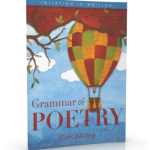This post contains affiliate links.

When the opportunity came to take a look at Grammar of Poetry from Compass Classroom, I jumped at the chance. I found what I wished I had had when I was teaching my children.
The video course is designed for sixth to ninth grade students. The material is basic enough that many students as young as ten will be able to follow along to build a foundation for future work.
Matt Whitling, the author and video teacher, begins, well, at the beginning. He assumes nothing on the part of the student or teacher. The lessons use the classical method of imitation to teach each concept. While students learn to understand the elements of poetry, they also learn to write poems as the masters have. More importantly, they learn to write well.
Unlike the way I was taught to write poems–rhyme some words and make short sentences and phrases. This step-by-tiny-step approach builds understanding of the foundation of the language and music of poetry. Unlike the common way of teaching poetry, which is a few poems added to a literature course, Grammar of Poetry is complete. Techniques used in all good writing are taught through the poetry, instead of isolated in a composition class.
The video lessons follow the book exactly with little added information. Mr. Whitling steps students through all of the exercises in the book. There is little to do outside of “class.” The lectures are geared toward the lower grade levels, so a high school student may become impatient with the slow pace.
A beauty of this course is it can be paced for an intensive one-month study or used throughout the school year. It consists of thirty lessons in ten modules. Although it is recommended to use the material three times a week for thirty minutes, you can decide how fast or slow to go through the material as fits your child or family. With that flexibility, a student can slow down where more work is needed for understanding or speed up when it’s smooth sailing.
I particularly like that everything is taught using great poetry and great poets as examples. I was disappointed that the wonderful poetic language on the King James Bible was not examined as well. I also would have like to have assignments, especially for older students, that involve longer or complete poems.
Douglas Wilson, author of Recovering Lost Tools of Learning, says Christians should study poetry because we are connected to the Word (John 1:1). He goes on to say students need to be well spoken, to be well spoken they need to be people of words. Poetry is essential to being well spoken. When students finishes this course, they will have be on the way to being well spoken and will have additional skills for other areas of writing.
Parents who, like me, enjoy good poems and the rich language of poetry, but never really learned how to use that language, will want to learn with their students. I know, even though I’m past my years of active homeschooling, I plan to continue to the end of the course to be better connected to words and the Word.
Grammar of Poetry from Compass Classroom
Leave a Reply